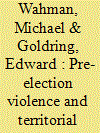|
|
|
Sort Order |
|
|
|
Items / Page
|
|
|
|
|
|
|
| Srl | Item |
| 1 |
ID:
178987


|
|
|
|
|
| Summary/Abstract |
How does the symbolic power of a female president affect female parliamentary behavior? Whereas female descriptive representation has increased around the world, women parliamentarians still face significant discrimination and stereotyping, inhibiting their ability to have a real voice and offer “thick” representation to women voters. We leverage the case of Malawi, a case where the presidency changed hands from a man to a woman through a truly exogenous shock, to study the effect of a female president on female parliamentary behavior. Drawing on unique parliamentary transcripts data, we argue and show that women MPs under a female president become empowered and less confined to stereotypical gendered issue-ownership patterns, leading to a significant increase in female MP speech making. Our results directly address theories of symbolic representation by focusing particularly on intraelite role-model effects.
|
|
|
|
|
|
|
|
|
|
|
|
|
|
|
|
| 2 |
ID:
137024


|
|
|
|
|
| Summary/Abstract |
Since the end of the Cold War, Western powers have frequently used sanctions to fight declining levels of democracy and human rights violations abroad. However, some of the world’s most repressive autocracies have never been subjected to sanctions, while other more competitive authoritarian regimes have been exposed to repeated sanction episodes. In this article, we concentrate on the cost–benefit analysis of Western senders that issue democratic sanctions, those which aim to instigate democratization, against authoritarian states. We argue that Western leaders weight domestic and international pressure to impose sanctions against the probability of sanction success and the sender’s own political and economic costs. Their cost–benefit calculus is fundamentally influenced by the strength of trigger events indicating infringements of democratic and human rights. Western sanction senders are most likely to respond to coups d’état, the most drastic trigger events, and tend to sanction vulnerable targets to a higher extent than stable authoritarian regimes. Senders are also more likely to sanction poor targets less integrated in the global economy and countries that do not align with the Western international political agenda, especially in responding to ‘weaker’ trigger events such as controversial elections. The analysis is carried out using a new dataset of US and EU sanctions against authoritarian states in the period 1990–2010.
|
|
|
|
|
|
|
|
|
|
|
|
|
|
|
|
| 3 |
ID:
170807


|
|
|
|
|
| Summary/Abstract |
Cross-national research on African electoral politics has argued that competition increases the prospects for pre-election violence. However, there is a dearth of systematic research on the effect of political competition on pre-election violence at the subnational level. We theorize that in African democracies characterized by competition at the national level but low subnational competitiveness (polarization), violence is often a manifestation of turf war and a tool to maintain and disrupt political territorial control. Consequently, contrary to expectations derived from the cross-national literature, pre-election violence is more likely in uncompetitive than competitive constituencies. Locally dominant as well as locally weak parties have incentives to perpetrate violence in uncompetitive constituencies. For locally dominant parties, violence is a tool to shrink the democratic space in their strongholds and maintain territorial control. For locally weak parties, violence can disturb the dominance of the opponent and protect their presence in hostile territory. We hypothesize that pre-election violence will be particularly common in opposition strongholds. In such locations, ruling parties can leverage their superior repressive resources to defend their ability to campaign, while the opposition can use their local capacity to reinforce the politics of territoriality. We test our hypotheses with original constituency-level election violence data from the 2016 Zambian elections. Data come from expert surveys of domestic election observers and represent a novel way of measuring low-level variations in election violence. Our analysis shows patterns of pre-election violence consistent with our theory on pre-election violence as a territorial tool.
|
|
|
|
|
|
|
|
|
|
|
|
|
|
|
|
|
|
|
|
|